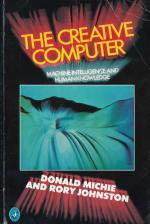
Personal Computer News
 15th December 1984
15th December 1984
Categories: Review: Book
Author: David Guest
Publisher: Viking Press
Machine: Spectrum 48K
Published in Personal Computer News #091
Professor Michie has long been one of the UK's most respected experts on artificial intelligence; Rory Johnston has risen through the ranks of technical journalism to reach the coveted status of pundit. Between them they seek to answer a question that has tormented man since the dawn of the computer age.
No, not Can Accrington Stanley ever get back into the Canon League. Rather, can computers ever output more than the sum of what they take in? Can they be creative?
Outside Accrington this is probably the more momentous question, and Messrs. Michie and Johnston treat it with due gravity. From the first three pages you might deduce it is more a manifesto for the survival of mankind than a treatise on artificial intelligence; the authors take the position that intelligent machines could be the foundation stone of our continuation as a species.
They also repeat the chilling credo of twentieth-century science - "But it is important that ... philosophical considerations ... do not confuse our commitment urgently to seek to exploit the beneficial potential of the new technology."
Blinkered, they embark on a fascinating study that takes in much more than a direct review of artificial intelligence techniques. This is a well-written book with the scope to fascinate most general readers. The text is broken up by sub-headings and liberally illustrated, in black and white and colour.
And eventually the authors build a convincing case for artificial intelligence as an answer to the world's woes. But they aren't too certain about how many of the world's woes can be ascribed to scientists who jettisoned philosophical considerations.


